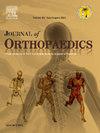Lateral meniscus extrusion on preoperative MRI and its impact upon mid-term clinical outcomes following mobile-bearing unicompartmental knee arthroplasty
IF 1.5
Q3 ORTHOPEDICS
引用次数: 0
Abstract
Background
The presence of full-thickness cartilage in the lateral compartment on valgus stress radiography is a criterion for medial mobile-bearing unicompartmental knee arthroplasty (UKA). However, the appropriateness of medial UKA is uncertain when preoperative MRI shows extrusion of the lateral meniscus. We therefore assessed how preoperative MRI-detected lateral meniscus extrusion affects mid-term functional outcomes after mobile-bearing UKA.
Methods
We retrospectively reviewed the records of our patients that underwent mobile-bearing medial UKA between January 2017 and December 2019. Crema's classification system was used to assess MRI of the lateral meniscus, categorizing patients as either grade 0 or ≥ grade 1. We preoperatively evaluated patient-reported outcomes using the Oxford knee score and Knee Society functional score, and then again at the latest follow-up. We also measured range of motion pre- and postoperatively. We compared preoperative individual data with outcome data obtained for at least three years.
Results
The lateral meniscus extrusion group included 19 knees, and the remainder included 98 knees. Clinical outcomes were similar between these groups (p > 0.05). No progression of lateral arthritis was observed in either group during the follow-up period.
Conclusion
Excluding UKA as an option for cases with lateral meniscus extrusion findings on preoperative MRI may require reconsideration.
术前MRI显示外侧半月板挤压及其对可移动单室膝关节置换术中期临床结果的影响。
背景:外翻应力x线片显示外侧室全层软骨是内侧可移动单室膝关节置换术(UKA)的标准。然而,当术前MRI显示外侧半月板挤压时,内侧UKA的适宜性是不确定的。因此,我们评估了术前mri检测的外侧半月板挤压对活动负重UKA术后中期功能预后的影响。方法:我们回顾性回顾了2017年1月至2019年12月期间接受移动承重的内侧UKA患者的记录。Crema分级系统用于评估外侧半月板的MRI,将患者分为0级或≥1级。我们术前使用牛津膝关节评分和膝关节协会功能评分评估患者报告的结果,然后在最近的随访中再次评估。我们还测量了术前和术后的活动范围。我们比较了术前个体数据和至少三年的预后数据。结果:外侧半月板挤压组19个膝关节,其余98个膝关节。两组临床结果比较,差异无统计学意义(p < 0.05)。在随访期间,两组均未观察到侧关节炎的进展。结论:排除UKA作为术前MRI发现外侧半月板挤压病例的选择可能需要重新考虑。
本文章由计算机程序翻译,如有差异,请以英文原文为准。
求助全文
约1分钟内获得全文
求助全文
来源期刊

Journal of orthopaedics
ORTHOPEDICS-
CiteScore
3.50
自引率
6.70%
发文量
202
审稿时长
56 days
期刊介绍:
Journal of Orthopaedics aims to be a leading journal in orthopaedics and contribute towards the improvement of quality of orthopedic health care. The journal publishes original research work and review articles related to different aspects of orthopaedics including Arthroplasty, Arthroscopy, Sports Medicine, Trauma, Spine and Spinal deformities, Pediatric orthopaedics, limb reconstruction procedures, hand surgery, and orthopaedic oncology. It also publishes articles on continuing education, health-related information, case reports and letters to the editor. It is requested to note that the journal has an international readership and all submissions should be aimed at specifying something about the setting in which the work was conducted. Authors must also provide any specific reasons for the research and also provide an elaborate description of the results.
 求助内容:
求助内容: 应助结果提醒方式:
应助结果提醒方式:


